
Private Dancer is the fifth solo studio album by American singer Tina Turner. It was released on May 29, 1984 by Capitol Records and was her first album released by the label. After several challenging years of going solo after divorcing Ike Turner, Private Dancer propelled Turner into becoming a viable solo star, as well as one of the most marketable crossover singers in the recording industry. It became a worldwide commercial success, earning multi-platinum certifications, and remains her best-selling album in North America to date.
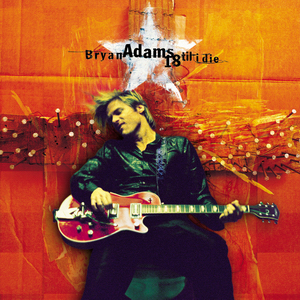
18 til I Die is the seventh studio album by the Canadian singer-songwriter Bryan Adams. Released on June 4, 1996, by A&M Records, the album became a commercial success peaking at No. 1 in the United Kingdom and No. 2 in his home country Canada. It was recorded on different locations which included Jamaica and France. 18 til I Die featured the number one song "Have You Ever Really Loved a Woman?", which had been released as a single and on the soundtrack to the film Don Juan DeMarco over a year prior, and 4 other singles: "The Only Thing That Looks Good on Me Is You", "Let's Make a Night to Remember", "Star", and "18 til I Die"; the album track "I'll Always Be Right There" was also released to radio in the United States. Adams traveled throughout North America and Europe to promote the album after its June release, notably playing in front of over 70,000 people at Wembley Stadium in July 1996. The album performed lower than expectations in the US but it sold 5 million copies worldwide.

Monster is the ninth studio album by American rock band R.E.M., released by Warner Bros. Records in the UK on September 26, 1994, and in the US the following day. It was produced by the band and Scott Litt and recorded at four studios. The album was an intentional shift from the style of their previous two albums, Out of Time (1991) and Automatic for the People (1992), by introducing loud, distorted guitar tones and simple lyrics.

Let's Talk About Love is the fifteenth studio album and fifth English-language album by Canadian singer Celine Dion, released on 14 November 1997 by Sony Music. The follow-up to the commercially successful Falling into You (1996), Let's Talk About Love showed a further progression of Dion's music. Throughout the project, she collaborated with Barbra Streisand, the Bee Gees, Luciano Pavarotti, Carole King, George Martin, Diana King, Brownstone, Corey Hart, and her previous producers: David Foster, Ric Wake, Walter Afanasieff, Humberto Gatica, and Jim Steinman. The album includes Dion's biggest hit, "My Heart Will Go On". Written by James Horner and Will Jennings and serving as the love theme for James Cameron's 1997 blockbuster film, Titanic, "My Heart Will Go On" topped the charts around the world and is considered to be Dion's signature song.

Whitney Houston is the debut studio album by American singer Whitney Houston, released on February 14, 1985, by Arista Records. Whitney Houston initially had a slow commercial response, but began getting more popular in mid-1985. It eventually topped the Billboard 200 for 14 weeks in 1986, generating three number-one singles—"Saving All My Love for You", "How Will I Know" and "Greatest Love of All"—on the Billboard Hot 100, which made it both the first debut album and the first album by a solo female artist to produce three number-one singles in the United States.

Galliano are a London-based acid jazz group that were originally active between 1988 and 1997. The group was the first signing to Eddie Piller and Gilles Peterson's Acid Jazz record label. The original members were Rob Gallagher, Constantine Weir (vocals), Michael Snaith and Crispin Robinson (percussion).
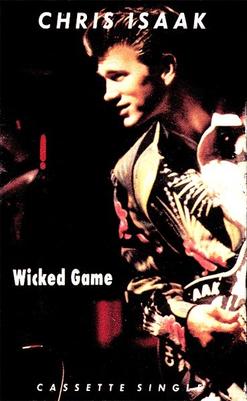
"Wicked Game" is a song by American rock musician Chris Isaak, released from his third album, Heart Shaped World (1989). Released as a single in July 1989, it became a sleeper hit after being featured in the 1990 David Lynch film Wild at Heart, starring Nicolas Cage and Laura Dern. Lee Chesnut, an Atlanta radio station music director who loved David Lynch films, began playing the song, and it quickly became an American top-10 hit in March 1991, reaching number six on the Billboard Hot 100. Internationally, the single became a number-one hit in Belgium and reached the top 10 in several other nations.
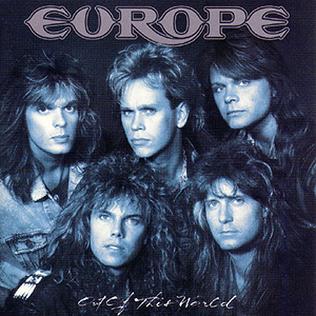
Out of This World is the fourth studio album by the Swedish rock band Europe. Released on 9 August 1988 through Epic Records, the album was a commercial success selling over 3 million units worldwide, peaking at number 19 on the US Billboard 200 chart and reaching high positions in charts worldwide. It was recorded at Olympic Studios and Townhouse Studios, London, England. Out of This World is the first Europe album to feature former Easy Action and Noice guitarist Kee Marcello.

"Every Rose Has Its Thorn" is a power ballad by American glam metal band Poison. It was released in October 1988 as the third single from Poison's second album Open Up and Say... Ahh!. The band's signature song, it is also their only number-one hit in the US, reaching #1 on the Billboard Hot 100 on December 24, 1988, for three weeks. It also charted at number 11 on the Mainstream Rock chart. It was a number 13 hit in the UK. "Every Rose Has Its Thorn" was named number 34 on VH1's "100 Greatest Songs of the 80s", number 100 on their "100 Greatest Love Songs" and number seven on MTV and VH1 "Top 25 Power Ballads". Billboard ranked the song number five on their list of "The 10 Best Poison Songs".

"Shop Around" is a song originally recorded by the Miracles on Motown Records' Tamla subsidiary label. It was written by Miracles lead singer Smokey Robinson and Motown Records founder Berry Gordy. It became a smash hit in 1960 when originally recorded by the Miracles, reaching number one on the Billboard R&B chart, number one on the Cashbox Top 100 Pop Chart, and number two on the Billboard Hot 100 chart. It was the Miracles' first million-selling hit record, and the first-million-selling hit for the Motown Record Corporation.
"When You Walk in the Room" is a song written and recorded by Jackie DeShannon. It was initially released as a single on November 23, 1963, as the B-side to "Till You Say You'll Be Mine". It was re-released as an A-side in September 1964, and later included on the album Breakin' It Up on the Beatles Tour. The single charted on the US Billboard Hot 100, peaking at number 99.

"Superstitious" is a 1988 single released by the Swedish rock band Europe. It was the first single released from the album Out of This World. It charted at #31 in the Billboard Hot 100, #9 at the Mainstream Rock Tracks and #34 in the UK Singles Chart. It was the last song by Europe to chart in the US.

"Summer Breeze" is a 1972 song by American soft rock duo Seals and Crofts. It is the title track of their fourth studio album, and was released as the album's lead single in August 1972. The song reached No. 6 on the US Billboard Hot 100 chart in the US. In 2013, it was ranked No. 13 in Rolling Stone′s "Best Summer Songs of All Time". The song also became a hit for the Isley Brothers in 1974.
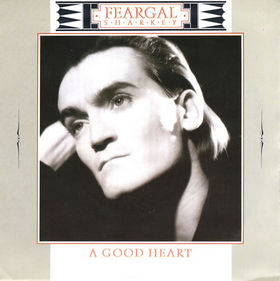
"A Good Heart" is a song written by Maria McKee and recorded by Northern Irish singer Feargal Sharkey, released as the first single from his self-titled debut album. It was released in September 1985 and became a number-one hit in the United Kingdom, Australia, Belgium, Ireland, and the Netherlands.

Heaven on Earth is the second solo studio album by American singer Belinda Carlisle. It was released on October 5, 1987, by MCA Records. Three singles reached the top 10 of the US Billboard Hot 100, including the number-one single and Carlisle's signature song "Heaven Is a Place on Earth". The album has been certified triple Platinum in the United Kingdom and Platinum in many countries, including the United States.
"It's All Over Now" is a song written by Bobby Womack and his sister-in-law Shirley Womack. It was first released by The Valentinos, featuring Bobby Womack, in 1964. The Rolling Stones heard it on its release and quickly recorded a cover version, which became their first number-one hit in the United Kingdom, in July 1964.
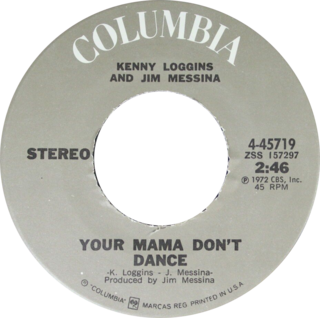
"Your Mama Don't Dance" is a hit 1972 song by the rock duo Loggins and Messina. Released on their self-titled album Loggins and Messina, it reached number four on the Billboard pop chart and number 19 on the Billboard Easy Listening Chart as a single in early 1973.

"Let's Dance" is a 1962 hit single by Chris Montez, written and produced by Jim Lee.

"Listen to Your Heart" is a song written, arranged and produced by Stock Aitken Waterman (SAW) for Sonia's debut studio album, Everybody Knows (1990). Released in November 1989 as the album's third single, it reached number ten on the UK Singles Chart and number 22 in Ireland. The B-side was Sonia's version of "Better Than Ever" which was originally recorded by Lisa Fabien and was not included on the original release of her debut album.

Then Jerico are an English rock band. They scored four top 40 hits in the UK during the 1980s.


















